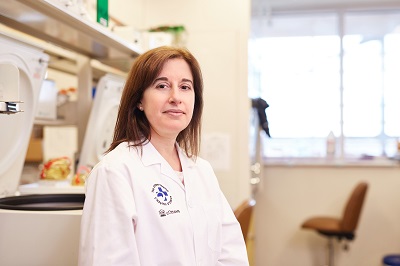 “Cancer cells are constantly evolving new ways to evade our therapies, so we designed this therapy to target cancer on multiple fronts at the same time,” said Dr. Carolina Ilkow.A research team based at The Ottawa Hospital and the University of Ottawa has developed a virus that infects and kills cancer cells without harming normal cells, while also sending out signals to prepare nearby uninfected cancer cells for viral attack. Their new study, published in Nature Communications, shows that this novel strategy can shrink tumours and significantly prolong survival in several cancer models in mice.
“Cancer cells are constantly evolving new ways to evade our therapies, so we designed this therapy to target cancer on multiple fronts at the same time,” said Dr. Carolina Ilkow.A research team based at The Ottawa Hospital and the University of Ottawa has developed a virus that infects and kills cancer cells without harming normal cells, while also sending out signals to prepare nearby uninfected cancer cells for viral attack. Their new study, published in Nature Communications, shows that this novel strategy can shrink tumours and significantly prolong survival in several cancer models in mice.
The strategy relies on extracellular vesicles, tiny particles that pinch off from a cell and fuse with other cells. The research team created a virus that causes infected cells to produce extracellular vesicles filled with a specific RNA that blunts the antiviral defenses of nearby cancer cells. They found that this novel virus can work with other forms of immunotherapy, as well as with small-molecule drugs, to enhance cancer-killing even further.
“Cancer cells are constantly evolving new ways to evade our therapies, so we designed this therapy to target cancer on multiple fronts at the same time,” said senior author Dr. Carolina Ilkow, senior scientist at The Ottawa Hospital and assistant professor at the University of Ottawa.
The researchers note that while many groups are investigating therapies based on extracellular vesicles, these therapies are much more difficult to manufacture and store than viral therapies. This new viral technology could have a broad impact, as it provides an easy and targeted way to “manufacture” and deliver RNA therapeutics and extracellular vesicles right inside the patient, rather than in a lab.
This research used a Maraba virus that has been tested in human clinical trials as a cancer therapy, but the strategy could be applied to other viruses as well. The researchers used several different models of pancreatic cancer (mouse and human) as well as models of ovarian, breast, kidney and skin cancer.
In addition to the researchers at The Ottawa Hospital and the University of Ottawa (Canada), the team includes researchers from the University of Leeds (UK), the University of Tabuk (Saudi Arabia), the University of Oxford (UK), the University of California Los Angeles (USA), the University of Ottawa Heart Institute (Canada) and Mount Sinai University (USA).
Authors: Marie-Eve Wedge*, Victoria A. Jennings*, Mathieu Crupi*, Joanna Poutou*, Taylor Jamieson, Adrian Pelin, Giuseppe Pugliese, Christiano Tanese de Souza, Julia Petryk, Brian J. Laight, Meaghan Boileau, Zaid Taha, Nouf Alluqmani, Hayley E. McKay, Larissa Pikor, Sarwat Tahsin Khan, Taha Azad, Reza Rezaei, Bradley Austin, Xiaohong He, David Mansfield, Elaine Rose, Emily E.F. Brown, Natalie Crawford, Almohanad Alkayyal, Abera Surendran, Ragunath Singaravelu, Dominic G. Roy, Gemma Migneco, Benjamin McSweeney, Mary Lynn Cottee, Egon J. Jacobus, Brian A. Keller, Takafumi N. Yamaguchi, Paul C. Boutros, Michele Geoffrion, Katey J. Rayner, Avijit Chatterjee, Rebecca C. Auer, Jean-Simon Diallo, Derrick Gibbings, Benjamin R. tenOever, Alan Melcher, John C. Bell and Carolina S. Ilkow
*Contributed equally
Funding: This research was supported by the Canadian Institutes of Health Research, the Canadian Cancer Society, the Ontario Institute for Cancer Research, The Ottawa Hospital Foundation, the Ottawa Regional Cancer Foundation, the Terry Fox Research Institute, the Lotte & John Hecht Memorial Foundation, Mitacs, the Government of Ontario, the Natural Sciences and Engineering Research Council of Canada, Lebovic Fellowship.
Core Resources: Flow Cytometry and Virometry Core, Histology Core, Biotherapeutics Manufacturing Centre
The Ottawa Hospital is a leading academic health, research and learning hospital proudly affiliated with the University of Ottawa. All researchers at The Ottawa Hospital follow a Responsible Innovation framework for developing and commercializing innovations in a responsible way. Some of the researchers involved in this study hold patents and are partnering with industry to move their research forward.
Media Contact
Jenn Ganton
613-614-5253
jganton@ohri.ca
